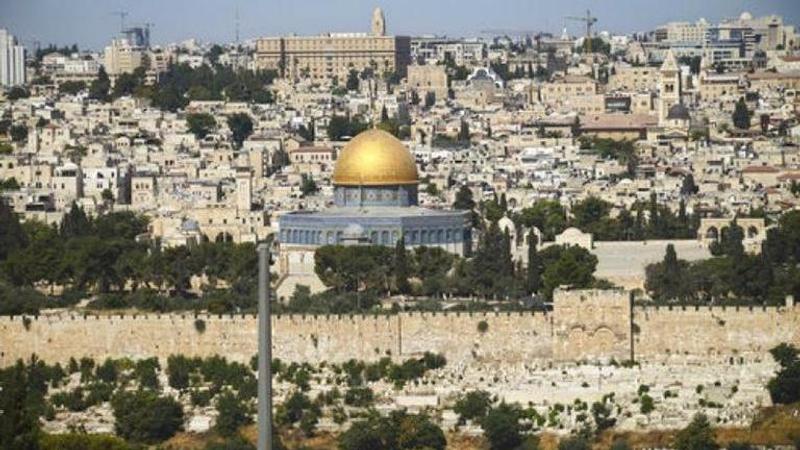Published 15:44 IST, March 15th 2020
Al-Aqsa mosque, 3rd holiest in Islam, closes over virus
The Islamic endowment overseeing the Al-Aqsa mosque compound, the third holiest site in Islam, says the mosque itself and other buildings will be closed over concerns about the new coronavirus.

The Islamic endowment overseeing the Al-Aqsa mosque compound, the third holiest site in Islam, says the mosque itself and other buildings will be closed over concerns about the new coronavirus.
Sheikh Omar Kiswani, the director of the mosque, said Sunday that prayers will continue to be held outdoors. The closure is to continue indefinitely.
Iran's official leading the country's response to the worst coronavirus outbreak in the Middle East on Sunday acknowledged that the pandemic could overwhelm health facilities in the country, which is under severe U.S. sanctions.
Iran is battling one of the worst outbreaks outside China, with nearly 13,000 confirmed cases and more than 600 fatalities. The real number of infections could be even higher, as questions have been raised about the government's transparency.
“If the trend continues, there will not be enough capacity,” Ali Reza Zali, who is leading the campaign against the outbreak, was quoted as saying by the state-run IRNA news agency.
Iran is believed to have around 110,000 hospital beds, including 30,000 in the capital, Tehran. Authorities have pledged to set up mobile clinics as needed.
Zali also acknowledged that “many” of those who have died from the COVID-19 illness caused by the virus were otherwise healthy, a rare admission by local authorities that the virus does not only prey on the sick and elderly.
The Health Ministry released figures showing that while 55% of fatalities were in their 60s, some 15% were younger than 40.
For most people, the new coronavirus causes only mild or moderate symptoms, such as fever and cough. For some, especially older adults and people with existing health problems, it can cause more severe illness, including pneumonia.
Most people recover in a matter of weeks. But the virus is highly contagious and can be spread by individuals with no visible symptoms.
The virus has infected more than 150,000 people worldwide and killed more than 5,700. More than 70,000 people worldwide have recovered after being infected.
In Iran, the virus has even infected a number of senior officials, including the senior vice president, Cabinet ministers, members of parliament, Revolutionary Guard members and Health Ministry officials.
Authorities have nevertheless been slow to adopt measures taken by other hard-hit countries. Iranian President Hassan Rouhani on Sunday ruled out a general quarantine and said the government was working to keep the borders open.
The country has also struggled to respond in part because of crippling sanctions imposed by the Trump administration after it withdrew from the 2015 nuclear deal. Last week, Iran asked the International Monetary Fund for a USD 5 billion loan, the first time it has sought help from the international lender since before the 1979 Islamic Revolution.
The US says it has offered humanitarian aid but that Iran has rejected it.
Countries across the Middle East have imposed sweeping travel restrictions, cancelled public events and in some cases called on non-essential businesses to close for the coming weeks.
In the skyscraper-studded city of Dubai, a global business and travel hub in the United Arab Emirates, authorities announced on Sunday that all movie theaters, arcades and gyms would be closed through the end of the month.
Dubai Parks & Resorts announced it would be closed through the end of the month. The sprawling amusement park, built at a cost of USD 3 billion, has lost hundreds of millions of dollars since opening. Abu Dhabi, the capital of the UAE, also shut down its amusement parks and museums through the end of the month, including Louvre Abu Dhabi. The UAE's central bank announced a $27 billion stimulus package directed at supporting banks and said regulatory limits on loans will be eased. Saudi Arabia announced its own $13 billion stimulus plan.
Tiny, oil-rich Kuwait meanwhile shut down malls, salons and barbershops to slow the spread of the virus. Authorities allowed coffee shops to remain open, but said no more than five customers can wait in line at a time and must be a meter apart from each other.
Dalia Samhouri, a senior official with the World Health Organization's regional office, urged countries to take further steps to aggressively track those who have been in contact with confirmed cases and to impose strict quarantine measures.
“It's not too late to control the situation or to contain the situation,” she said.
In Israel, Prime Minister Benjamin Netanyahu's trial on serious corruption charges, which was supposed to begin this week, was postponed for two months due to restrictions on public gatherings.
Netanyahu has meanwhile been pressing for an emergency unity government with his main rival, former military chief Benny Gantz, following three inconclusive elections and more than a year of political deadlock. Gantz has appeared open to the idea.
Image credit: AP
Updated 15:44 IST, March 15th 2020




